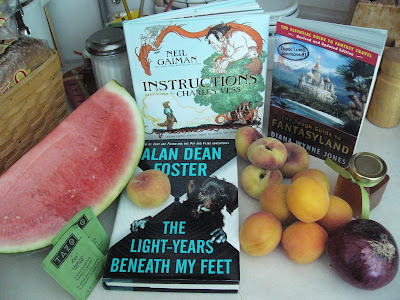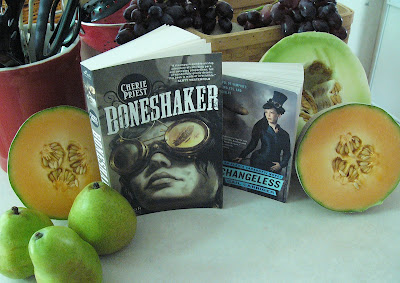Along with all the delicious fantasy, today we shall enjoy watermelon, nectarines, saturn peaches, and a bit o’ tea with honey:
Yeah, that’s a red onion in there. I’m just making sure you’re paying attention.
A bit about the fantasy: Neil Gaiman + Charles Vess = Yum. Enough said. In the back on the right, we see The Tough Guide to Fantasyland by Diana Wynne Jones. If you read a lot of fantasy, you’ll find this really amusing. I was reading it in Starbucks and laughing out loud, drawing glares from staid, sober types who always glare at me when I laugh out loud. (I might be the only person who laughs in my neighborhood. I really need to move out.) The Tough Guide deals with all the clichés of fantasy, and let me tell you, they’re still getting used even though this book came out a few years ago. My favorite is how everyone eats stew. Even though it takes hours to make stew from scratch, especially over a camp fire, all these heroes are eating stew on their journeys instead of slicing off a steak from a slain animal and cooking that in a few minutes. Seriously, have you ever tried to make stew from scratch, without using pre-made broth or stock? Try it and then check out how long it takes them to do it in a novel. That’s magic.
The featured book here is The Light-Years Beneath My Feet by Alan Dean Foster. This is also a few years old, but what I really want to do is express my fanboy ecstasy for Mr. Foster’s body of work rather than draw attention to any particular book. He’s written over thirty-five books for Random House alone. He’s written more with other publishers. Check out the list here. That’s a long, prolific career, friends. He’s written science fiction and fantasy; he’s written series and standalones. And no matter what you pick up, you’ll get a good read, guaranteed. He’s not a #1 bestseller (I don’t think?), he doesn’t win fancy-schmancy awards, he just gives you an entertaining read, every time, and he’s been doing it since 1972. I first got hooked on him with The Man Who Used the Universe. I’ve read it so many times that my copy is falling apart. After that I read The I Inside, and I liked that even more. (Those links are to Powells, and you’ll probably have to find those books at used bookstores because they’re out of print now.)
There are only a few authors who write books that I read multiple times. I revisit Card’s Ender’s Game quite a bit; McCaffrey’s Dragonsinger series; Herbert’s Dune; Stephenson’s Snow Crash; Tolkien, of course; and then there are these little books by Mr. Foster that I just dig for some reason. The first book of his Damned trilogy, A Call to Arms, keeps me coming back. I really enjoyed Drowning World and Life Form, too. And Mudge, the otter from his Spellsinger series, started me laughing out loud in public early on and drawing glares from stuffy old people. If you’ve never given Mr. Foster a look, he’s worth a try. He’s bound to have written something you’d enjoy with fifty or so books to his name. He’s basically the guy who got me hooked on science fiction when I was young; his Spellsinger books were also the first fantasy I ever read. In many ways, he’s the reason I’m a writer now. Mr. Foster, I salute you—and thank you for all the great stories.



